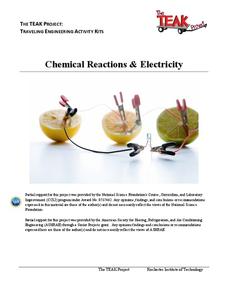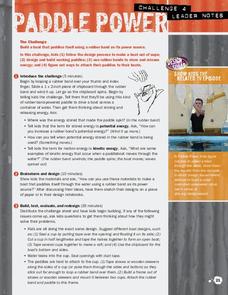PHET
Faraday's Electromagnetic Lab
"But still try, for who knows what is possible." - Michael Faraday. Faraday's advice features in a simulation that permits pupils to play with a bar magnet in order to make a light bulb glow connecting electromagnetic induction to...
Rochester Institute of Technology
Chemical Reactions and Electricity
After a discussion of chemical reactions and electricity, scholars break into groups and follow a scripted activity to discover if fruit can power a clock. After a concluding discussion, the class a presented with a challenge.
Texas State Energy Conservation Office
Investigation: Conservation of Energy
By rolling marbles down a six-foot length of track, physical scientists determine how much energy is lost to heat. It is recommended that you opt for the foam pipe insulation track because more friction slows the marble, allowing...
Curated OER
Energy Jeopardy
While science Jeopardy games are a dime-a-dozen, this one has some pretty unique categories that are still relevant to a middle school physical science curriculum. The topics include: leading nations, famous Americans (who invented...
Curated OER
Solar Electricity ~ The Colour Sensitivity of a Photovoltaic Cell
Teacher's notes, a materials list, detailed procedure, tips, and extension ideas are all included to make teaching this lesson plan on photovoltaic cells a sunny spot in your day! After some brief background reading, physical science...
Curated OER
Regents High School Examination - Physics 2010
Give every type of learner in your physics class an opportunity to demonstrate what they have learned throughout the year. From analyzing tables and graphs, to evaluating diagrams and solving problems, there is an outstanding variety of...
Bonneville
Let's Build Our Wind and Solar Energy Toy
Who says toys can't be educational? The fourth of five parts in the Solar Updraft Towers unit has scholars create toys that run on solar and wind energy. The devices need to be solar updraft towers that can be placed on a warm surface...
Bonneville
Wind Power: A Hands on Experience
Turn a learning experience into a fun lesson. Future engineers create blades for a wind turbine using card stock. Using a fan, they test how well the blades help the wind turbine turn. The goal is to build blades that are effective...
Bonneville
Solar Powered Calculator
The perfect place to do one's math homework? Outside, of course. The third of seven lessons in the Understanding Science and Engineering unit focuses on solar energy. Learners investigate solar-powered calculators and discover how solar...
Workforce Solutions
Newton's Laws
Two lessons explore the connection between energy transformation and a given job. In lesson plan one, small groups role-play a scenario that showcases the energy transformations that may take place during a job-specific task. The second...
Smithsonian Institution
Science Starts With a Question: Energy - Teacher Guide
Get an up-close look at energy transfer. Using a three-part activity, investigators first observe a teacher-led demonstration before building a model marble track to convert potential energy to kinetic energy. Scientists explore six...
Bonneville
Illuminate Me: Merging Conductive Sewing, Technology, and Solar Power
Sew up a unit on solar energy with a hands-on project. Groups sew LED lights on clothing using conductive thread. Solar modules attached to a helmet provide the energy for the lights. A final presentation gives learners the opportunity...
Bonneville
Three Ways to Generate Electricity
Get your hands on electricity. Pupils investigate magnetic fields and make the connection to generators in the fourth lesson in a series of six lessons on wind versus solar energy. Learners use a small electric motor as a generator to...
Bonneville
Introduction to Circuits
Light up the class's knowledge. Pupils build a simple circuit using a battery, wire, and a light bulb and create a diagram of their circuit. The teacher provides a short lecture on a complete circuit, calling attention to the direction...
Bonneville
Introduction to Energy
Transform the classroom with energy. Pupils learn about different types of energy and practice identifying the types in the first lesson of six in a solar versus wind energy unit. The class sees examples of how one type of energy can be...
Purdue University
Can You Design a Hot or Cold Pack?
You're getting warmer. Groups conduct an experiment to determine which of four chemicals are in hot/cold packs. They learn about exothermic and endothermic reactions and use this knowledge to design a hot/cold pack that is small enough...
Physics Classroom
Work
Current work lesson plan just not ... working? Add an engaging interactive that helps pupils explore positive and negative work relationships! Individuals assess situations to determine what type of work, if any, the resource describes....
Magic of Physics
Franklin's Lab
Get energized! Circuitry scholars follow the path of energy from its beginnings as a fossil fuel all the way to bulbs and batteries using an interesting interactive. Groups or individuals help Ben Franklin discover how to convert and...
Teach Engineering
Photosynthesis—Life's Primary Energy Source
Wouldn't it be great if you could produce your own food? Scholars learn about the processes of photosynthesis and cellular respiration in plants. They consider how to use photosynthesis as a model of an efficient system and how to apply...
Teach Engineering
Energy Forms, States and Conversions
Even magicians can't make energy disappear. In a discussion-based lesson plan, young scientists learn about energy forms and conversions. They see how energy is neither created nor destroyed; it just changes forms. This is the 11th...
PBS
Paddle Power
Potentially get all the way across the water. The fourth of five design challenges asks pupils to develop a plan for a paddle-powered boat that will store its energy. Given a limited number of supplies, the class members design, build,...
Teach Engineering
Exploring Energy: Energy Conversion
The energy is not really lost, it is just converted to a different form. Pupils learn about the conversion of energy in the fifth segment of an energy unit with six parts. Learners develop an understanding of the conservation of energy...
Teach Engineering
Exploring Energy: Kinetic and Potential
The potential of the energy in the class is moving. The third segment in a six-part unit on energy provides a deeper understanding of kinetic and potential energy. Learners understand the relationship between mass, speed, and energy and...
American Chemical Society
Soda Can Steam Engine
Steam engines have been around since the late 1600s, yet most pupils don't know how they work. Using an soda can, the instructor builds a simple steam engine for scholars to observe. Through a discussion, young scientists learn about the...

























